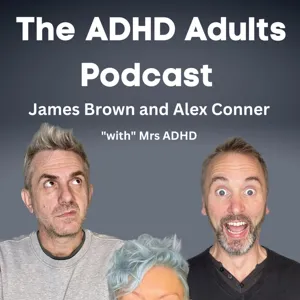Podcast Summary
Discussing social connections and emotions: Social connections bring happiness and make a difference in others' lives, even in those with ADHD. Cognitive dissonance can arise from conflicting emotions and experiences, and empathy and compassion are crucial in navigating these situations.
Humans are social creatures who find happiness not only in their own accomplishments but also in making others feel good and appreciated. In this episode of the ADHD adults podcast, James Brown and Dr. Alex Connor discussed their weeks, highlighting the importance of social connections and the impact of social situations on their emotions. They also touched upon the topic of cognitive dissonance and how it relates to their experiences with ADHD. Additionally, they mentioned their love for recording and listening to their own voices, which is the reason they started the podcast. Despite the occasional challenges and low moments, they emphasized the importance of empathy, compassion, and the joy of making a difference in others' lives.
James's Desire for Connection and Personal Growth: James values human connection and continues to work on his mental health, sharing his experiences and seeking help when needed, while striving to make his listeners happy.
James finds happiness not only in his own solitude but also in making others happy. He shared his past experiences, including his dislike for the Dalai Lama's mandala practice and his recent poll workshop, revealing his need for human connection. James also discussed his ongoing mental health journey, sharing that he has started coaching again and has stopped smoking as a form of self-harm. Despite the challenges, he expressed gratitude for the experiences and the people in his life. Additionally, he mentioned the risk of disappointing his podcast listeners if he doesn't meet their expectations. Overall, the conversation highlighted James's desire for connection and his ongoing personal growth.
The power of supportive communication during challenging times: Effective communication can help us reconsider emotions and feelings, prevent misunderstandings, and provide much-needed support during difficult times.
The power of supportive communication can make a significant difference in someone's life, even during challenging times. The speaker shared a personal experience of feeling understood and appreciated by listeners after a difficult week, which helped them reconsider their emotions and feelings. Additionally, the speaker shared some anecdotes about misunderstandings and mistakes, highlighting the importance of clear communication and the potential consequences of assumptions. The speaker also emphasized the importance of reaching out to others for support when needed. Despite the occasional hiccups and mishaps, the overall message was one of resilience and the importance of connection with others.
Stay Calm and Approach Problems Systematically: Staying calm and thinking systematically can save time and energy in problem-solving. Don't let emotions cloud judgment and overlook obvious solutions.
Effective problem-solving often involves staying calm, thinking systematically, and not jumping to conclusions. In the story shared, the speaker lost their testosterone and searched frantically for it, only to find it in the bin the next day. They could have saved time and energy by systematically searching each room and checking the bin from the start. Similarly, when they missed important phone calls from their GP, they could have prioritized their phone calls over other tasks. In both cases, the speakers' emotions clouded their judgment and led them to overlook the obvious solution. The moral of the story is that taking a step back, staying calm, and approaching problems systematically can lead to more efficient and effective solutions. Additionally, the speaker shared their experience of helping strangers understand complex scientific concepts by drawing graphs and explaining them in simple terms. This highlights the importance of clear communication and the ability to break down complex ideas into understandable parts.
Understanding Neurodivergent Priorities: Neurodivergent individuals process information differently and prioritize tasks uniquely. It's crucial to accommodate their ways of thinking to prevent misunderstandings and ensure inclusivity.
Neurodivergent individuals, such as those with ADHD, may prioritize tasks differently than neurotypical individuals, and this can sometimes lead to misunderstandings or near misses. Rebecca, a colleague, was able to remember her shopping list in order of importance without even realizing it was a priority, while James, who has ADHD, struggled with this concept. James shared an experience where he almost attended the wrong university for a talk due to a misunderstanding of the location name versus postcode. These incidents highlight the importance of understanding and accommodating neurodivergent ways of thinking and prioritizing tasks. It's essential to remember that everyone processes information differently, and neurodivergent individuals bring unique strengths and perspectives to the table.
ADHD and shoplifting: Exploring the connection: People with ADHD may be more likely to shoplift due to impulsivity and forgetfulness, but more research is needed to fully understand this relationship
There seems to be a connection between ADHD and shoplifting, although the nature of this connection is not entirely clear. During a podcast discussion, it was revealed that one of the hosts had a history of shoplifting as a child and wondered if there was a link between this behavior and their ADHD diagnosis. While there is evidence that people with ADHD are more likely to engage in criminal activities on average, the specific connection to shoplifting, particularly of items that aren't necessary, is less clear. The hosts discussed how impulsivity and forgetfulness, common symptoms of ADHD, could contribute to shoplifting behavior. However, they acknowledged that more research is needed to fully understand this relationship. Overall, the discussion highlighted the complex nature of the connection between ADHD and criminal behavior, and the importance of continued research in this area.
Impulsivity and shoplifting: Understanding complex motivations: Impulsivity and guilt play a role in shoplifting, but individual motivations and external influences like financial necessity or medications can also contribute.
Impulsivity and shoplifting, particularly in childhood, may be linked, but the role of guilt and internal morals versus external laws is a complex issue. Some people may shoplift due to a sense of injustice or financial necessity, while others may experience impulsivity and a lack of guilt. Additionally, certain medications like beta blockers may have side effects that mimic symptoms of Attention Deficit Hyperactivity Disorder (ADHD), potentially contributing to or worsening symptoms. This discussion highlights the complexity of understanding shoplifting behavior and the importance of considering various factors, including individual motivations and external influences.
Connection between Migraines, OCD, Eating Disorders, and ADHD: Beta blockers used for ADHD can have side effects and don't guarantee appearance of overlapping symptoms. Individual responses to medications vary. ADHD symptoms can change over a lifetime, and diagnosing it in women can be challenging.
While there is a connection between migraines, OCD, eating disorders, and ADHD, the relationship is complex. Beta blockers, which can help manage some ADHD symptoms by affecting noradrenaline levels, can also have side effects due to their impact on other receptors. The symptoms of ADHD can overlap with those of other conditions, but taking beta blockers does not guarantee the appearance of those symptoms. We're all unique, and our responses to medications can vary. The tiniest bit of evidence suggests that some people may find relief from certain symptoms with the use of these medications, but it's essential to consult a healthcare professional for personalized advice. The question about whether ADHD can change over a lifetime was answered affirmatively, with some individuals reporting that they masked their symptoms as children and now experience more combined symptoms as adults. The discussion also touched on the challenges of diagnosing ADHD in women and the importance of acknowledging the impact of societal expectations and past experiences on symptom presentation.
ADHD symptoms can change and vary throughout a person's lifetime: ADHD symptoms can fluctuate due to hormonal changes, developmental delays, and internalization of external symptoms. Seeking professional help and support can be beneficial in managing symptoms and understanding the condition.
Symptoms of ADHD can change and vary significantly throughout a person's lifetime. Hormonal changes, developmental delays, and internalization of external symptoms are just a few factors that contribute to the fluctuation of symptoms. Furthermore, individuals with ADHD may not have a clear understanding of their own symptoms and may compare themselves to their peers, leading to misunderstandings or misdiagnoses. The internalization of external hyperactivity and poor metacognition can make it difficult for adults with ADHD to recognize and acknowledge their symptoms. Ultimately, it's important to remember that everyone's experience with ADHD is unique and that seeking professional help and support can be beneficial in managing symptoms and understanding the condition.
Exploring the feelings of discomfort and tension from misalignment: Cognitive distance refers to the discomfort felt when holding two opposing thoughts or values, causing tension and anxiety, especially for individuals with ADHD.
During their podcast discussion, they humorously allowed Alex to write about cognitive distance for an episode because he was sad, even though Sam had no editorial rights or understanding of the theme at the time. Cognitive distance refers to the discomfort felt when holding two opposing thoughts or values, which can cause tension and anxiety, particularly in individuals with ADHD. Although Alex may have had an easy win, the primary reason for choosing this theme was to describe the personal feelings of tension and anxiety that come from not aligning actions, thoughts, or values with one's beliefs or strengths. Despite some forgetfulness and distractions during the conversation, they both agreed that cognitive distance was an appropriate theme for exploring the feelings of discomfort and tension that can arise from misalignment.
Beliefs shaped by experiences and biases influence understanding of information: People with ADHD may have unique biases, but it's important to acknowledge them and be open to learning and growth. Understanding the origins of our beliefs and recognizing cognitive biases can lead to valuable insights and growth.
Our belief systems, shaped by our experiences and biases, significantly influence how we perceive and understand information. People with ADHD may experience unique biases due to their condition, such as a bias towards their lived experience or a bias towards waiting for concrete evidence. It's essential to acknowledge these biases and be open to learning and growth, even if our beliefs don't align with the evidence. The discussion also highlighted the importance of understanding the origins of our beliefs and the potential impact of cognitive biases on our learning and interactions with others. While it's natural to hold strong beliefs, it's crucial to remember that no one has all the answers and that being open to new perspectives can lead to valuable insights and growth.
Recognizing and addressing biases: Engage in self-reflection to acknowledge personal biases and foster growth through interactions within the ADHD Adult community.
It's essential to acknowledge and address our own biases before criticizing others. This was a key theme discussed in episode 115 of the ADHD Animals podcast, which marked the first 3rd Thursday extradition and aired on a Friday following the regular Monday episode. The speaker emphasized the importance of self-reflection and the understanding that everyone has biases. They encouraged listeners to engage with the ADHD Adult community on various social media platforms, including Discord, Twitter, Instagram, Facebook, and others. Despite the speaker's apology for losing the script, the main message remained clear: recognizing and addressing our biases is crucial for personal growth and better interactions with others.





